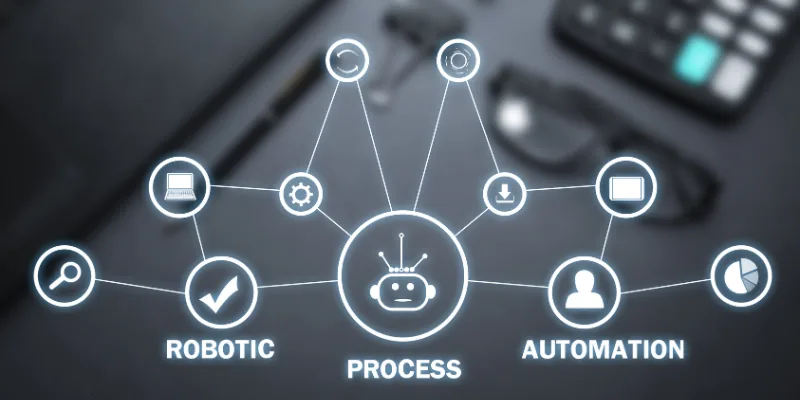Advantages of Computer in Offices for Productivity & Efficiency
Published: 14 Feb 2025
In today’s fast-paced business world, computers have become indispensable in offices. Research shows that companies utilizing modern computer systems see productivity increases of up to 40%. From handling routine tasks like data entry to enhancing team communication, computers streamline nearly every aspect of office work. With their ability to process vast amounts of information in seconds, computers allow businesses to operate more efficiently, save time, and improve overall performance, making them a vital tool for success. The key advantages of computer in offices are following:
Increased Productivity
Computers help employees get more work done in less time. With tools like word processors, spreadsheets, and communication apps, tasks are completed quickly and efficiently. This means employees spend less time on manual work and more time on important tasks.
- Speed up repetitive tasks like typing and calculations
- Automate simple jobs, reducing workload
- Helps employees manage their time better
- Makes it easier to track work progress
- Reduces distractions, allowing workers to stay focused
- Provides tools to set reminders and deadlines
- Organizes data in a way that’s easy to access
- Allows for fast communication, speeding up decision-making
- Simplifies collaboration, making teamwork more efficient
- Increases the overall output of the office

Better Communication
Computers make communication in the office easier. With email, video calls, and instant messaging, teams can stay connected no matter where they are. Shared documents allow employees to work together in real-time, making it simple to collaborate on projects.
- Send and receive messages instantly via email or chat
- Video calls allow meetings without physical presence
- Share files quickly with cloud services
- Collaborate on documents and projects in real-time
- Instant feedback helps improve work quality
- Makes it easier to communicate with remote employees
- Reduces misunderstandings with clear written communication
- Facilitates faster decision-making through group discussions
- Organizes communication into threads, reducing confusion
- Increases flexibility by allowing multiple collaboration tools
Data Management
With computers, businesses can store and manage large amounts of data. Instead of using paper files, employees can organize, search, and retrieve documents with ease. This reduces the chances of losing important information and helps businesses stay organized.
- Store large volumes of data securely
- Quickly search for specific documents and information
- Categorize and organize files by type or date
- Easily back up data to prevent loss
- Share and update documents without physical copies
- Use databases to track important information
- Maintain a record of activities and transactions
- Monitor employee performance through digital records
- Keep all company records in one central location
- Reduces the need for physical storage space

Cost Savings
Using computers reduces many office expenses. Digital files save money on paper, ink, and storage. Automation also helps companies reduce labor costs and improve efficiency by cutting down on manual work.
- Reduces the need for paper and ink
- Saves money on physical storage space
- Cuts down on office supplies like pens and folders
- Eliminates the cost of printing and mailing documents
- Reduces manual labor, saving on employee hours
- Lowers energy costs with more efficient systems
- Avoids costly mistakes with automated tools
- Reduces the need for physical filing cabinets
- Helps businesses scale without additional overhead
- Makes office operations more cost-effective overall
Task Automation
Computers help automate tasks that are usually repetitive and time-consuming. Simple processes like data entry, appointment scheduling, and payroll can be done with just a few clicks. This automation frees up time for employees to focus on more important tasks.
- Automates routine tasks like data entry
- Schedules appointments and reminders automatically
- Processes payroll without manual calculations
- Tracks inventory automatically without manual counting
- Handles customer orders and billing processes
- Sends automated emails or reports to customers
- Handles employee timekeeping and attendance
- Automates social media posts or marketing tasks
- Reduces the chances of human error in daily tasks
- Allows employees to focus on higher-level tasks

Secure Storage
Computers offer secure ways to store business data. Files can be protected with passwords, encrypted, and backed up to prevent loss. With digital storage, there’s no need to worry about losing important documents or misplacing physical files.
- Store files securely with password protection
- Use encryption to protect sensitive data
- Back up important data regularly to avoid loss
- Share documents securely through encrypted cloud services
- Set access permissions to control who can view or edit files
- Protect against theft or loss of paper records
- Quickly restore data after a system crash or issue
- Keep sensitive data safe from unauthorized access
- Use firewalls to protect the office network
- Reduce the risk of losing records with cloud storage

Remote Work Flexibility
Computers allow employees to work from anywhere. With cloud services and communication tools, people can access files, attend meetings, and collaborate with colleagues without needing to be in the office. This flexibility helps businesses remain productive during challenging times.
- Work from home or any location with an internet connection
- Access files from any device with cloud storage
- Attend meetings through video conferencing tools
- Use communication tools to stay in touch with the team
- Track progress and collaborate on projects remotely
- Allows for flexible working hours
- Increases employee satisfaction by offering work-life balance
- Helps businesses remain functional during emergencies
- Offers the option to hire talent from anywhere
- Reduces office overhead costs (e.g., rent, utilities)
Accuracy and Error Reduction
Computers help reduce mistakes in the workplace. By using software for calculations and data entry, errors are minimized. With automated checks, tasks like accounting and inventory tracking are more accurate, saving time and avoiding costly mistakes.
- Automatically checks for errors in calculations
- Reduces human errors in data entry and record keeping
- Ensures consistency across documents and reports
- Identifies issues like incorrect formulas or missing data
- Prevents errors in financial transactions and payroll
- Increases the reliability of reports and documents
- Helps with proofreading and grammar checks
- Reduces the need for manual error correction
- Allows employees to focus on more strategic work
- Improves overall business accuracy and efficiency
Document Creation
Computers make creating and editing documents easier. With tools like word processors and graphic design software, employees can quickly make changes, format text, and share documents with others. These tools make collaboration on documents smoother and faster.
- Quickly create documents using word processors
- Edit and format documents easily without starting over
- Collaborate on documents in real-time with colleagues
- Use templates to create documents faster
- Automatically save drafts, reducing the risk of losing work
- Track changes made to documents for review
- Insert images, graphs, and tables to improve presentations
- Convert documents to different file formats for sharing
- Share documents with colleagues across locations
- Simplify the process of finalizing and distributing reports

Faster Decision-Making
Computers allow businesses to analyze data quickly using software like Excel or specialized business tools. This helps managers make decisions faster by offering insights and trends. The ability to process data in real-time leads to more informed decisions that benefit the business.
- Use data analysis tools to spot trends quickly
- Process large amounts of data in seconds
- Present information visually through charts and graphs
- Make better business decisions with accurate data
- Access real-time data to monitor business performance
- Use forecasting tools to predict future trends
- Automatically generate reports to aid decision-making
- Analyze customer feedback to improve services or products
- Track sales performance and adjust strategies accordingly
- Make faster, more informed decisions with data-driven insights
Computers help make office work faster and easier. They help with tasks like typing documents, sending emails, and storing information. This saves time, reduces mistakes, and keeps everything organized in one place. Computers also improve communication, allowing teams to work together more easily.
Computers allow employees to complete tasks more quickly by automating repetitive work. Software tools help with managing projects, tracking progress, and keeping documents organized. This lets people focus on important tasks rather than spending time on manual work, boosting overall productivity.
Yes! Computers help businesses save money in several ways. They reduce the need for paper, ink, and storage space by allowing digital documents and online communication. Automation also reduces the number of mistakes that might require costly corrections or manual labor.
Computers make communication faster and more efficient. Emails, video calls, and instant messaging help team members stay connected, whether they’re in the same office or across the globe. Computers make it easy to share ideas, feedback, and documents quickly, improving teamwork and collaboration.
Yes! Many businesses use specialized software to manage tasks more effectively. For example, tools like project management software (e.g., Trello, Asana) help keep teams organized, while accounting programs (e.g., QuickBooks) handle financial data. These advanced tools help streamline workflows and ensure accuracy.
Computers help reduce errors by automating calculations and organizing data. Software like spreadsheets and accounting programs check for mistakes automatically. This is much more reliable than manual work, where small errors can go unnoticed and cause big problems later.
Yes! Computers allow employees to work remotely by using cloud services and communication tools. Tools like video conferencing and file-sharing platforms make it easy to collaborate with colleagues no matter where they are, helping businesses stay flexible and continue to operate even when employees are working from home.
Computers improve office security through encryption, passwords, and secure networks. Sensitive information can be stored in password-protected files or cloud services with high-level security. Additionally, companies can back up data regularly, preventing the loss of important documents and protecting against cyber threats.
Basic computer use includes tasks like word processing, email, and simple file management. More advanced office technology involves specialized software for managing projects, finances, and customer data. These tools require more technical knowledge but provide enhanced efficiency and better organization for businesses.
Start by learning basic skills like using word processors, spreadsheets, and email. Then, explore tools that are specific to your business needs, like project management or customer relationship software. Training your team to use these tools will help your office run more smoothly and efficiently.
Conclusion
So guys, in this article, we’ve covered the advantages of computers in offices in detail. As we’ve seen, computers help improve productivity, accuracy, and communication. These advantages can make a real difference in how smoothly your office runs. I recommend taking time to evaluate your current office tech and look for ways to integrate more efficient tools. Start small if needed, and take the first step towards transforming your office workflow today!

- Be Respectful
- Stay Relevant
- Stay Positive
- True Feedback
- Encourage Discussion
- Avoid Spamming
- No Fake News
- Don't Copy-Paste
- No Personal Attacks

- Be Respectful
- Stay Relevant
- Stay Positive
- True Feedback
- Encourage Discussion
- Avoid Spamming
- No Fake News
- Don't Copy-Paste
- No Personal Attacks
